Events
LISTEN TO THE RECORDINGS on RADIO 22 TOUT-MONDE!
R22 Tout-monde is a web radio launched in June 2014 by Khiasma, a cultural platform and art center based in Les Lilas (93), a suburb close to Paris. It circulates and shares sound documents of all forms, produced by an ensemble of contributors from all over the world. These documents are conceived of as living archives and resources for action. R22 Tout-monde is a partner of The Day After and Bétonsalon - Centre for Art and Research.
Wednesday March 11 / 7-9pm
MARYAM JAFRI at SOMETHING YOU SHOULD KNOW
Off-site: EHESS
Maryam Jafri presents her work in the frame of Something You Should Know (artists and producers today), a seminar conceived and organozed by Patricia Falguières, Elisabeth Lebovici, Hans-Ulrich Obrist and Nataša Petrešin-Bachelez
Tuesday march 17 / 6-9pm
THE DAY AFTER EXHIBITION OPENING
& LAUNCH OF QALQALAH
Saturday March 21
Taxi Tram
TRAM, the contemporary art network of Paris / Ile-de-France organizes a bus trip to discover three exhibitions: Monologue by Vandy Rattana at Jeu de Paume, Mongkut by Arin Rungjang at Maison d’art Bernard Anthonioz and The Day After at Bétonsalon – Centre for Art and Research. Info : 0033 1 53 34 64 43 or taxitram@tram-idf.fr
Friday March 27 / 2-4pm
The artist as researcher and digital heritage
offsite: Paris Diderot University
In the framework of the Usages des Patrimoines Numérisés (uses of digitalized heritage) network, the Intermediality (EMOI) seminar organized by Isabelle Barbéris welcomes Maryam Jafri, in conversation with Isabelle Barbéris (Lecturer in Performing Arts and Live Arts), Virginie Bobin (Associate Curator, Head of education at Bétonsalon - Centre d’art et de recherche) and Emmanuelle Raynaut (artist).
Tuesday 7 - Thursday 9 April
NATIONAL DAYS FOR ARTS and CULTURE in the UNIVERSITY Paris Diderot
Tuesday April 7, noon-2pm
An Unverifiable Attempt to Enter History
Guided tour with participants from Denis Diderot workshop and Soufiane Ababri. (see p. 27)
Thursday April 9, 1-3pm
Guided tour with students from Master 1 Journalisme, Culture et Communication scientifique (Paris Diderot University).
Friday April 10 / 10.30am – 5.30pm
Boys don’t cry
Off-site: MAC/VAL
Artist Soufiane Ababri is invited to present the work developed during the workshop An Unverifiable Attempt to Enter History in the framework of a 3 days program of meetings, performances and screenings conceived in echo with Cherchez le garçon , an exhibition he is taking part of at MAC/VAL. April 10, 11 and 12, full program available on www.macval.fr/
Free entrance.
Saturday April 11 / 2-7pm
IMAGES IN DEPENDENCES
With, among others: Maryam Jafri, Dominique Malaquais (Researcher at the Center for African Worlds Studies, CNRS) and Cédric Vincent (Doctor in Anthropology and researcher at the Center for Anthropology of writing, EHESS), Soufiane Ababri (artist), Sarah Frioux-Salgas (Head of Archive at Collections documentation, Quai Branly Museum)...
How is history framed by its representations? How are images and their significations affected by their context of circulation? In the company of Maryam Jafri and her guests, photographs, magazines and films will serve as a trigger to explore the itineraries of images and the successive webs of meanings produced by historical narratives and representations, from postcolonial, non-aligned perspectives.
Saturday April 25 / 2-7pm
OUT of FRAME: AN AMBIVALENT AFTERNOON
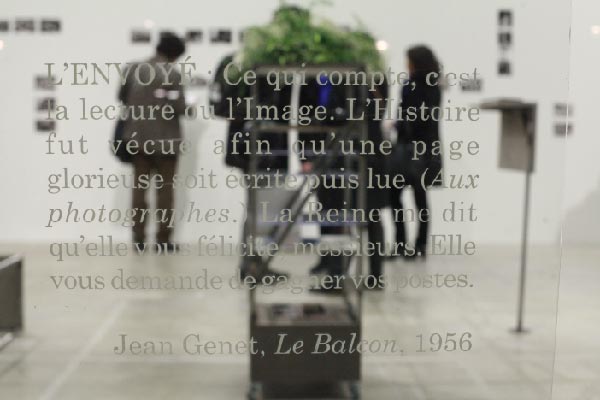
With participants from the research group égalité / hybridité / ambivalence at the Ecole Supérieure d’Art et de Design Toulon Provence Méditerranée : Anaïs Dormoy, Jean-Loup Faurat, Géraldine Martin, Julie Origné, Axelle Rossini, Ian Simms, Mabel Tapia and Margaux Verdet. Guest: Maxime Guitton. In the presence of Maryam Jafri.
In the course of an afternoon, the exhibition The Day After welcomes ambivalent navigations, traveling through film abstracts, readings, performances and hybrid soundscapes that infiltrate the interstices between Maryam Jafri’s images. Over the last few months, the research group égalité / hybridité / ambivalence initiated at the ESADTPM (an art school in Toulon, France) has attempted to map the possible genealogies, displacements and theoretical links between, on the one hand, a principle of equality understood as an ethical, political and aesthetic principle; and, on the other hand, notions of hybridity, ambivalence and decentering, from heterogenous perspectives. The resources they have accumulated are recomposed and shared through Renkan, a tool for the creation of collaborative, heuristic maps.
Following a week-long workshop within the exhibition The Day After, nurtured by meetings with Maryam Jafri (artist), Maxime Guitton (programmer, curator), Olivier Marboeuf (writer, curator, director of Espace Khiasma) and Em’kal Eyongakpa (artist in residency at Kadist Art Foundation), artists from the research group invite the audience to embark on multiple journeys through the proliferating space of heuristic maps and the more material space of the exhibition.
2-3.30pm: Compositions / recompositions
Following his exchanges with participants from the research group, Maxime Guitton (programmer, curator) proposes a public listening session where activist, popular and high music are composed and recomposed through a series of back-and-forth between North America and India (among others).
3.30-6.30pm: Diagonal lines
Visual, sound and performative documents are activated by artists and researchers from the ESADTPM research group, taking the exhibition The Day After as a starting point.
This event is supported by l’Ecole Supérieure d’Art et de Design Toulon Provence Méditerranée.
Wednesday May 13 from 7 to 9 pm
Screening of La Pyramide Humaine by Jean Rouch (1961, 1h30)
Off-site: Buffon auditorium, Paris Diderot university
One year before the Ivory Coast became independent, Jean Rouch invites white and black high school students from Abidjian to stage a friendship. Proposed by students from Master I Journalisme, Culture et Communication Scientifiques from University Paris Diderot in the frame of CinéDiderot, in partnership with the service Culture of Paris Diderot university. More info here.
Thursday 21 May / 5-7 pm
Archive in Echo : Rethinking the Memories and Imaginaries of Colonial Independences.
Session 2/3: Independences in question: an ellipsis within human and social sciences?
A seminar organized by the research group Le noeud du monde : politique du corps (post)colonial: Jephthé Carmil (PhD in Sociology at Université Paris 7 – Paris Diderot and at the Nantes art school), Maïa Hawad (PhD in Political Philosophy at Université Paris 7 – Paris Diderot and in Anthropology at EHESS) and Pauline Vermeren (Doctor in Political Philosophy and Associate researcher at the Laboratoire de changement social et politique (LCSP) at Université Paris 7-Diderot).
By deterritorializing archives from their conventional uses and recontextualising them within the sphere of art, Maryam Jafri questions the production and management of collective memory. What does this archival nomadism produce, and how does it operate in relation to the writing of colonial history ? What other kinds of discourses and narratives does Jafri’s methodology allow to emerge ? How does her archival deterritorialization relate to contemporary postcolonial situations and their current debates ?
Next and last session: June 18.
Thursday May 28 from 5 to 7pm // Parallel event
Launch of L’homme qui mordit son chien, an editorial project by students from the writing workshop of Licence 3 Arts, Lettres, Langues at Paris Diderot university, under the supervision of Julie Ramage.
Friday May 29 from 6 to 6.30pm // Parallel event
Pourquoi Moi, a choral performance by Emmanuelle Raynaut with Johanna Korthals Altes, Satchie Noro, Emmanuelle Raynaut and Kerwin Rolland.
After an invitation by Isabelle Barbéris (lecturer at Paris Diderot university), in the frame of the UDPN - Usages des patrimoines numérisés (Idex SPC) program, artist Emmanuelle Raynaut presents a version of Pourquoi Moi, a creation, born out of residencies in Beirut and in Rome, in the archive of NGO UMAM and the Vatican storage.
Produced by AREP-Cie Région Centre, co-produced by UMAM-dg The Hangar, ZINC-Friche Belle de Mai, CORSINO-Studio-44, Cie Maroushka/ Festival Ecoute Voir, LIEUX FICTIFS, La Muse en Circuit, le CERILAC and UDPN, with support from Dicream.
Saturday May 30 from 3 to 6pm
Exercizing Doubt : Exhibition as a Medium for Research
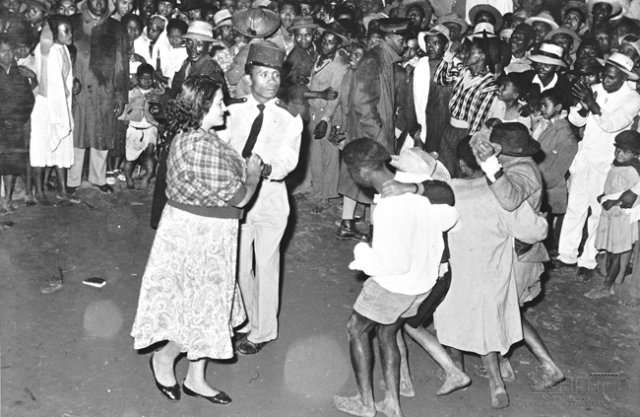
- Popular ball in the Andravoahangy neighborhood the night of the "fête de la République" on Saturday October 21, 1958. ANTA Fund, Madagascar.
With Emanuele Guidi (artistic director, ar/ge kunst, Bolzano), Invernomuto (Simone Bertuzzi & Simone Trabucchi, artists), Virginie Bobin (associate curator, head of public programs at Bétonsalon – Centre for Art and Research) and Rémi Parcollet (art historian).
An afternoon of visual and theoretical essays around exhibition as a medium for research, where time allows to rethink the relations between art and the public sphere, beyond disciplinary categories.
PROGRAM
3 pm: Welcome
3.10 – 3.30 pm: Emanuele Guidi, Situating Research: Between the Institution and the City
While positioning ar/ge kunst, the art centre he directs in Bolzano, within the cultural and political landscape of South Tyrol (a bilingual region of Italy on the border with Austria), Emanuele Guidi will weave together specific examples of artistic and curatorial practices, the politics of display and modes of research that broaden the space and time of the exhibition format so as to facilitate forms of shared knowledge production. Guidi will focus on one case study in particular: Gareth Kennedy’s project “The Uncomfortable Science”, which took place in Bolzano in 2013/14 as part of “One Year-Long Research-Project”, an ongoing series of research and production residencies at ar/ge kunst.
3.40 – 4 pm: Invernomuto, Hit by the Archive
Italian duo Invernomuto retraces the paths of two ongoing projects: Negus, a series of films exploring the metaphor of the Negus and its connection to the colonial past of Italy, while retracing the Jamaican musical tradition of versioning; and Malu - Lo Stereotipo della Venere in Italia, which looks at a very specific archive of Italian Mondo Movies and Mondo Sexy from the 60s and 70s. Both projects took shapes through a succession of exhibitions, films and publications – including protagonists such as the legendary musician Lee “Scratch” Perry. Invernomuto’s research revolves around different outputs: the exhibition constitutes only one of them. (in English)
4.15 – 4.35 pm:Virginie Bobin, WEAVING (from a Dance to a Fire to a Bouquet of Flowers)
Looking at a 1958 photograph of a traditional dance in Madagascar; deciphering the consequences of a criminal fire at the library of the university of Algiers in 1962; tracing the many lives of a flower bouquet from 1960 to today: through the examination of specific elements contributed respectively by an academic, students and an artist to Maryam Jafri’s current exhibition at Bétonsalon – Centre for Art and Research, Virginie Bobin will unwind the web of relations, practices and temporalities that constitute and expand an exhibition conceived as an active platform for the circulation and contamination of different forms of knowledge. (in English)
4.45 – 5.05 pm: Rémi Parcollet, Documenting exhibitions, exhibiting documents
The archive (notably the visual one) of Harald Szeemann’s exhibition “Live in Your Head. When Attitudes Become Form: Works – Concepts – Processes – Situations – Information” (1969 Bern) have played a crucial role in the reconstitution that Germano Celant orchestrated with Thomas Demand and Rem Koolhaas at Fondazione Prada in Venice in 2013. How did the research on the documentation of the original exhibition structure, influence and determine this « reconstruction » ? (in French)
5.15 – 6pm : Discussion with the audience
Participants
Virginie Bobin is associate curator and head of public programs at Bétonsalon – Centre for Art and Research. She has worked notably at Witte de With Centre for Contemporary Art in Rotterdam and Les Laboratoires d’Aubervilliers, while developing independent curatorial and editorial projects, with a specific interest in the intersections between artistic practices, research and collaborative ways of working.
Emanuele Guidi is a writer and curator. Since July 2013, he has been the artistic director at ar/ge kunst, the Kunstverein of Bolzano (Italy) where he develops a program around artistic positions that reflect on exhibition-making as medium of research and on the relationship between visual art and design, dance, publishing and theory (www.argekunst.it). Previous projects and exhibitions include, a.o.: How to Tell a Story (DEPO, Istanbul 2013, curated with Cathy Larqué); Between Form and Movements (Galleria E.Astuni, Bologna, 2012), Rehearsing Collectivity – Choreography Beyond Dance (Tanzfabrik, Berlin, 2011, curated with Elena Basteri, Elisa Ricci and Aldo Giannotti), Collective Body (Liquid Loft, Vienna, 2010, curated with Aldo Giannotti).
Invernomuto is a duo formed by Milan-based artists Simone Bertuzzi and Simone Trabucchi in 2003. Their medium of choice is sound and the moving image. Other forms with which they are interested are sculpture, publishing, and live actions. Their most recent solo shows and performances include: The Celestial Path (GAMeC, Bergamo, 2013), I-Ration (ar/ge kunst, Bozen, 2014), Negus – Far Eye (Museion, Bozen, 2014), Marsèlleria (Milan, 2014), Anabasis Articulata (Triennale di Milano, Milan, 2014), ArtSpeak (Vancouver, 2015) and Wondo Genet (AuditoriumArte, Rome, 2015). Their work was also featured in such group shows and festivals as Biennale Architettura 11 (Venice, 2008), Hors Pistes 2009 (Centre Pompidou, Paris, 2009), Milano Film Festival (Milan, 2013), Black Star Film Festival (Philadelphia, 2014), Bozar (Brussels, 2015), Nero su Bianco (American Academy in Rome, 2015) among others.
Rémi Parcollet is a historian of contemporary art. He works on the history of exhibitions, from contemporary perspectives on bodies of visual archive, heritage and digital humanities, on the treatment of images in the history of museums, and on visual testimonies in the artistic and cultural field. He is the co-editor of Postdocument magazine.
In collaboration with ar/ge kunst, in the framework of PIANO, Prepared Platform for Contemporary Art, France–Italy 2014-2016, initiated by d.c.a / French association for the development of centres d’art, in partnership with the Institut français in Italy, the French Embassy in Italy and the Institut français, with the support of the French Ministry of Foreign Affairs and International Development, the French Ministry of Culture and Communication and Fondazione Nuovi Mecenati.
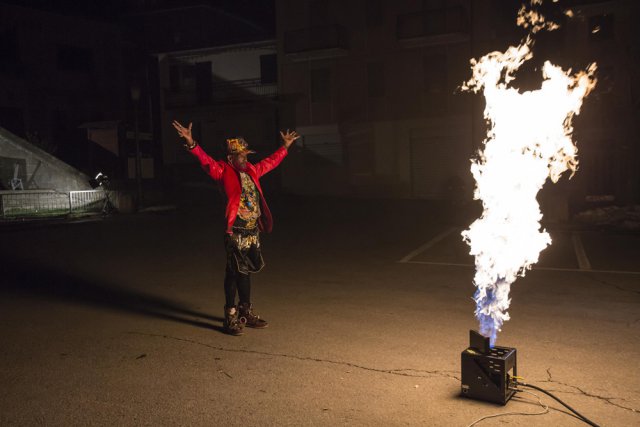
- Invernomuto, Negus, 2013 (set picture). (c) Invernomuto.
Sunday May 31 / 11am - 5pm
CRISS-CROSSING the ARCHIVE
Artist talk and workshop by Maryam Jafri
Off-site: University of the Arts, Central St-Martins, London
Organized by Making Public(s), an online publication platform for Exhibition Studies initiated by the students of the MRes: Art Exhibition Studies programme at Central Saint Martins, University of the Arts London.
Monday 1 and Tuesday 2 June
IS THERE A POSTCOLONIAL REGIME for the ARTS ?
Off-site: Paris Diderot University - Amphi Buffon (Monday June 1) / Amphi Turing (Tuesday June 2)
The globalization era is, evidently, postcolonial. Yet, the postcolonial is often presented as the reverse of globalization rather than as its correlate. To wonder if there is a postcolonial regime for the arts is to question the postcolonial dimension of artistic globalization. Today, art, like money, ignores borders: it is the most fluid of cultural exchanges. We will attempt to seize what is happening in the arts today, not from the viewpoint of the West and globalization, but from “the rest of the world” and postcoloniality, crossing perspectives from “here” and “there”.
Organized by Seloua Luste Boulbina, with the Laboratoire de changement social et politique and Afrikadaa magazine.
Detailed program and practical information available here.
The event will conclude with a guided tour of Maryam Jafri’s exhibition The Day After at Bétonsalon.
Saturday June 13 / 10am – 7pm
OTHER GESTURES: PRACTICES OF HERITAGE
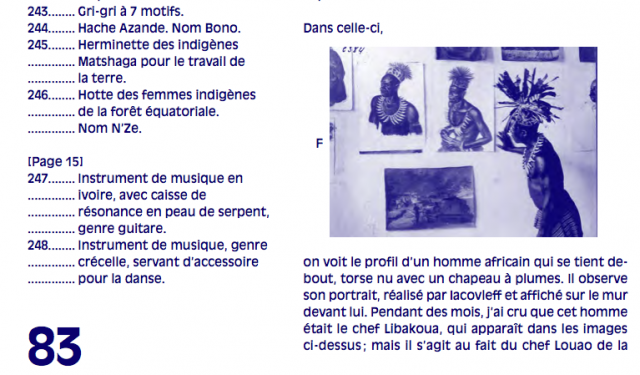
- Extract from Emma Wolukau-Wanambwa’s contribution about "La Croisière Noire" for Qalqalah, n°1, 2015
With Lotte Arndt (theory professor at École d’art et design in Valence), Marian Nur Goni (historian), Nana Oforiatta-Ayim (writer and historian), Franck Ogou (archivist, head of programs at Ecole du Patrimoine Africain), Zineb Sedira (artist), Ashok Sukumaran (artist), Françoise Vergès (political scientist) and Emma Wolukau-Wanambwa (artist).
Other Gestures gives voice to artists, researchers, collectives and institutions who question the modalities of collecting, preserving, circulating and activating archival and heritage materials, notably through digitalization. The Day After and Maryam Jafri’s work testify for the complex role that tools for preserving and circulating heritage (sometimes others’ heritage) played in the identitarian and ideological construction of States after independence. Today, the legitimacy of the very idea of Nation is reassessed by globalization, and this has an impact on what is at stake in archive and heritage. We wonder what relationships do the « imagined communities » described by Arjun Appadurai entertain with material and immaterial heritage, when the most priviledged way of accessing it is through digital reproduction. What are possible alternatives to the national institution of the archive? What gestures, uses and networks are at play to turn heritage into a tool for emancipation and knowledge?
Interventions will take place in French and in English. Translation will be provided in both languages.
The day will conclude with the launch of Qalqalah, a Reader, in the presence of the editorial team (Bétonsalon – Centre for Art and Research and Kadist Art Foundation Paris) and contributors Lotte Arndt, Marian Nur Goni and Emma Wolukau-Wanambwa.
PROGRAM
10.30 a.m. – Welcome and Introduction
1st Part: PRESERVING and DISPLACING HERITAGE
11 - 11.30 a.m. – Franck Ogou (archivist, head of programs at Ecole du Patrimoine Africain), in conversation with Marian Nur Goni (historian): African Photographic Archive: Current Status and Preservation Initiatives
Who are the actors who are attempting at preserving photographic archive on the African continent today? What are the means and the range of their actions ? And how did precedent gestures and experiments of promotion impact this long-term endeavor ? These are some of the pressing issues that Franck Ogou and Marian Nur Goni will address during their conversation, with a particular focus on the project of the Ecole du Patrimoine Africain (Porto-Novo), around Cosme Dossa’s archive.
11.40 a.m. - 12.10 p.m. – Emma Wolukau-Wanambwa (artist): THE SEEABLE, THE SAYABLE AND THE SYSTEM*
In her present engagement with archives, Emma Wolukau-Wanambwa explores their functions as mechanisms of control. She is interested in how societies use them, in their varying material and immaterial forms, to shape and to govern what is known, what is said and what is seen. In her presentation, she will address these issues with reference to the British government’s handling of its official colonial archives, and to her recent experiences of researching the archive of ’La Croisière Noire’ - the 30,000km journey overland from Algeria to Madagascar that was conceived by the French car manufacturer Citroën and sponsored by Louis Vuitton.
(*Title is borrowed from a lecture by Stephen Dixon.)
12.10 p.m. - 12.30 p.m. – Discussion moderated by Lotte Arndt (theory professor at École d’art et design in Valence)
12.30 - 2 p.m. – Lunch break
Light meals will be available for sale.
2nd Part: PARA-INSTITUTIONS of the ARCHIVE
2 - 2.30 p.m. – Nana Oforiatta-Ayim (writer and historian): Cultural Encylopaedia: The Archive as a Work of Art
The Cultural Encyclopaedia is a large-scale documentation and archive project, initiated by Nana Oforiatta-Ayim, in order to facilitate the re/ordering of knowledge, narratives and representations from and about the African continent. The Cultural Encyclopaedia is represented as a digital platform, in published volumes, and through living history hubs, and is intended to provide a foundation for alternative narratives of development by generating, collecting and sharing knowledge.
2.40 - 3.10 p.m. – Ashok Sukumaran (artist and member of Camp) ): Don’t Wait for the Archive
The experiences with Pad.ma, a platform for video footage material we run for seven years, tell us that the approach to the big word Archive is always provisional and incomplete. We are always imagining uses and abuses of the archive, before we have an archive as such. This is its strength. It describes the power of a "platform" to produce imagination, as a place from where the world looks different. It is also the practical form in which small groups of people and computers are taking over what was historically a function of the state, and where it is clear that the state has failed us.
3rd Part: LIVING ARCHIVE
3.20 - 3.50 p.m. – Screening of Gardiennes d’Images Part. I by Zineb Sedira (2010)
4 - 4.30 p.m. – Zineb Sedira (artist): Memory Keepers
Gardiennes d’images is a portrait of Safia Kouaci, the widow of Mohamed Kouaci, an Algerian photographer who documented the war of independence and died in 1996. Safia is not the only custodian of the archive, as together with Zineb Sedira they go back through the past to recall and record stories and images. The work is a double homage to Safia and Mohamed, a remarkable couple, a historical document, and a filmic reflection on aging and solitude.
4.40 - 5 p.m. – Closing remarks by Françoise Vergès (political scientist)
5 - 5.30 p.m. – Discussion moderated by Virginie Bobin (co-curator of The Day After)
5.30 - 7 p.m. – Drinks and launch of Qalqalah , a reader co-edited by Bétonsalon – Centre d’art et de recherche and Kadist Art Foundation Paris.
The event is co-organized with the Chaire Global South(s), held by Françoise Vergès in the frame of her seminar at Collège d’études mondiales de la Fondation maison des sciences de l’homme. It receives support from the Collège d’études mondiales and from the UDPN - Usages des patrimoines numérisés (Idex SPC) program. Nana Oforiatta-Ayim’s participation is organized with Kadist Art Foundation Paris. Ashok Sukumaran’s participation is organized with the seminar Something You Should Know - Artists and Producers Today.
Thurday 18 June / 5-7pm
Archive in Echo : Rethinking the Memories and Imaginaries of Colonial Independences.
Session 3/3: "Postcolonial turn": its adventure in the contemporary art field
A seminar organized by the research group Le noeud du monde : politique du corps (post)colonial: Jephthé Carmil (PhD in Sociology at Université Paris 7 – Paris Diderot and at the Nantes art school), Maïa Hawad (PhD in Political Philosophy at Université Paris 7 – Paris Diderot and in Anthropology at EHESS) and Pauline Vermeren (Doctor in Political Philosophy and Associate researcher at the Laboratoire de changement social et politique (LCSP) at Université Paris 7-Diderot).
Jeudi 25 juin / 19-20h
A CONSERVATOR’S TALE
Performance by Kapwani Kiwanga
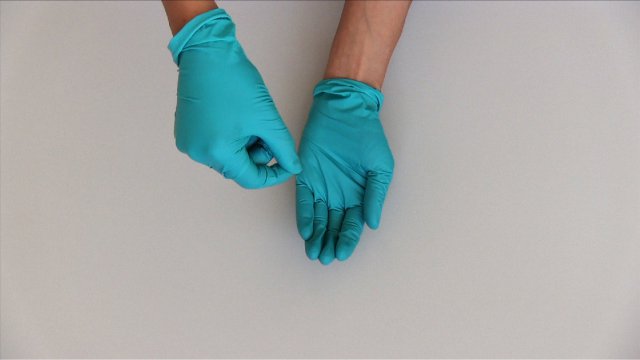
- Kapwani Kiwanga, "Forms of absence", video still, 2014.
In A Conservator’s Tale, Kiwanga assumes the role of a conservator in charge of very specific and subjective archives. She makes silent objects speak, embodies forgotten accounts and tells fantastical stories. Unusual anecdotes, unspoken facts and mythical beasts all have their place in the stories told by Kiwanga. By combining readings, sound and video extracts, the artist explores the status of the document, but also the possibilities of oral transmission.
This event concludes the seminar The Place from Where We Look organized by Kadist Art Foundation from June 23 to 25, 2015 in Paris, in the frame of Collecting Matters, a program initiated in 2012 by Kadist Art Foundation (Paris), Nomas Foundation (Rome) and David Roberts Arts Foundation (London), to encourage new ways of thinking, sharing and thinking the notion of collection. The Place from Where We Look is supported by Contemporary Art Heritage Flanders (CAHF).
Bétonsalon - Centre for Art and Research contributed to select the group of international participants for the seminar - Marianna Hovhannisyan, Yu Ji, Moses Serubiri, Simon Soon, Yesomi Umolu and Natalia Zuluaga – and hosts the last day of professional encounters.
More information about the public program of events is available on
www.kadist.org / http://collecting-matters.tumblr.com
Kapwani Kiwanga wishes to thank Jeu de Paume, Marta Ponsa and Nataša Petrešin-Bachelez.
Sunday July 5 / 1-7pm
HOSPITALITÉS 2015
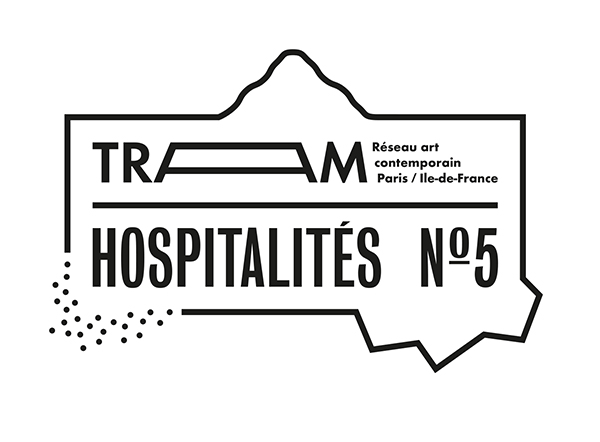
With Soufiane Ababri, Nelson Bourrec Carter and Camille Ayme, as well as Barbara Manzetti (with Tanguy Nédélec) and Philippe Artières, guests of Hospitalités 2015.
MAC VAL, Bétonsalon – Centre for Art and Research et and Ygrec, Ensapc gallery propose a discovery of the exhibitions Cherchez le garçon, The Day After and State of the Road, unfolding subjective stories as a possible resistance against normative power structures. In the frame of Hospitalités, an event organized by the TRAM network.
Participation : 7 euros per pers. (4 euros reduced fare : students, unemployed). Information : 01 53 34 64 43 or taxitram@tram-idf.fr - www.tram-idf.fr
Friday July 10 / 2-3.30 p.m.
Histories of Contestatory/Contested Photographs
Off-site: La Sorbonne
Histories of Contestatory/Contested Photographs is a panel organized by Erika Nimis and Marian Nur Goni, two researchers associated with the exhibition The Day After, in the framework of ECAS (the European Conference for African Studies). Historians Helihanta Rajaonarison and Jürg Schneider, who also contributed to The Day After, will participate.
Following the path of a growing number of works (Christraud Geary, 2002 and Estelle Sohier, 2012) analyzing the social and political life of photographic images produced on the African continent since the second half of the 19th century (in order to enlighten history with renewed tools while enriching a global history of photography), this panel aims at bringing to light the various contexts in which photographs, their uses and the circulations of their media, have been able at some point to dispute the prevailing views of their times. Read more here.
Detailed list of participants here.
Saturday July 11 / 4 p.m.
FINISSAGE and PERFORMANCE by ANNE HISTORICAL
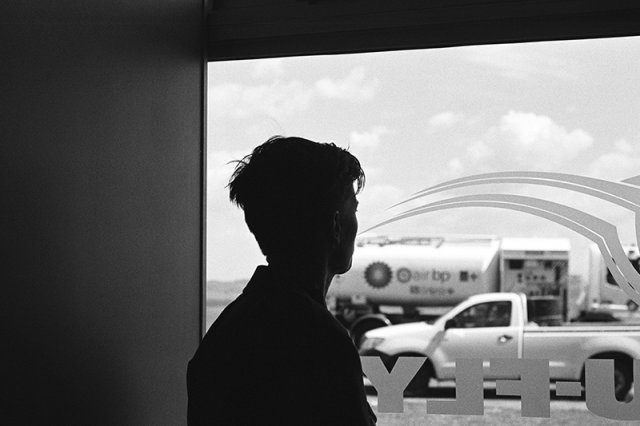
Competitors Leave at Dawn: the race from Johannesburg
A performance lecture by Anne Historical (Bettina Malcomess)
A performance that forms part of project, ’The Memories of Others’: a series of appearances working with voice, gesture and moving image. The work begins begins from newsreel footage of the ‘Great African Air Race’ from the United Kingdom to Johannesburg. With only one plane actually finishing and 3 fatal accidents en route, the race was a failure. The narrator of the performance is a character afflicted with the ability to remember the memories of others. This is not unlike the mechanism of film: a receptacle for memories never experienced. Working with the narrative of a journey never witnessed, the piece reflects on the colonial imagination of the continent as a single territory.
In the context of Africa Acts, a weeklong arts and culture event dedicated to performance art from Africa and her diasporas (5-12 July 2015), an initiative of the European Conference on African Studies, developed by Institut des Mondes Africains (IMAF) and Les Afriques dans le Monde (LAM) / CNRS, in collaboration with l’agence à paris. With thanks to Dominique Malaquais.
About the European Conference on African Studies and Africa Acts
The sixth edition of the European Conference on Africa Studies (8-10 July 2015) is structured around the following theme: Collective Mobilizations in Africa: Contestation, Resistance, Revolt. Music, graffiti, cinema, theatre, dance: art has had, and continues to have, a powerful effect on the kinds of mobilizations referenced here. From Cairo to Cape Town, performance and politics are intimately linked and bring radical heft to movements and moments alike. Echoing this key role of the arts, for the first time the European Conference on African Studies welcomes over thirty panels focusing on visual and expressive cultures. See detailed program here.
Paralleling the European Conference on African Studies, Africa Acts has been developed in concert with a wide variety of cultural spaces across the city of Paris. Intended for a broad public of Parisians and visitors, Africa Acts will offer ambitious and innovative programing highlighting the specificity and the originality of boundary-breaking artists. These are artists whose work speaks truth to power, taking to task and, simultaneously, transcending the social, economic and political violence of our 21st century world. Individually and as a group, they seek to re-enchant their environments: to dream and rethink them in light of imaginaries crafted to do away, once and for all, with ready-made ideas and clichés.
WORKSHOPS
AN UNVERIFIABLE ATTEMPT TO ENTER HISTORY
A workshop led by Soufiane Ababri, as part of Paris Diderot University’s Ateliers Diderot
From February 3 to April 7
Every Tuesday noon - 2pm
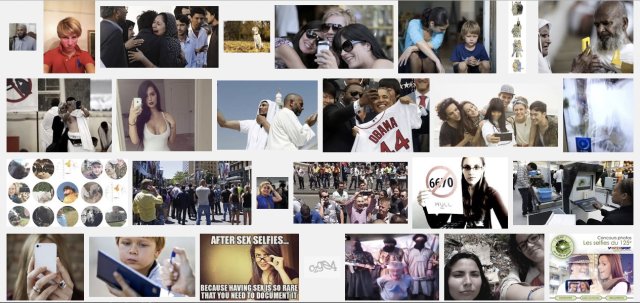
How to enter history? Through which ways? Alone, or as a group? Can we write history via side ways, unofficial and unverifiable paths? Using a wide range of tools (interviews, investigations, image analysis), artist Soufiane Ababri invites us to collectively question our capacity to "enter history" (to figure in it, to play a part in it, to transform it). Each session will bring together a range of materials (TV archive, films, texts, artworks) from a variety of sources. Rather than acquiring "techniques" (no prior knowledge or experience is needed), the aim of this workshop is to imagine ways for art to become a medium for research and a political tool.
The workshop is open to all. Registration required. Sign up with the Cultural Services of Paris Diderot university: service.culture (at) univ-paris-diderot.fr / 01 57 27 64 36 / 01 57 27 59 37
More information here.
About Soufiane Ababri
Born in 1985 in Tangiers, Soufiane Ababri graduated from the National Superior School of Decorative Arts and from the Superior School of Fine Arts of Montpellier Agglomération. His work was exhibited at the French Institute in Amsterdam in 2013 and at In Between in Brussels in 2014. In 2015, he participates in « Cherchez le garçon », a collective exhibition at MAC/VAL and is a resident at Cité des Arts in Paris. Together with curator Karima Boudou, he is editing a magazine-exhibition to be launched at Cube in Rabat in the Fall of 2015.
//
IMAGES IN DEPENDENCE: MEDIA CIRCULATIONS
A workshop organized in collaboration with the master 1 Journalisme, Culture and Communication Scientifique (Paris Diderot University) and Thierry Lefebvre.
With Sarah Balfagon Viel, Anne-Sophie Boutaud, Sarah-Louis Filleux, Barbara Gineau Delyon, Numa Journiac, Laurène Levy, Alice Mounissamy, Léo Tessier, Cécile Thibert, Benjamin Vignard, Océane Vincent.
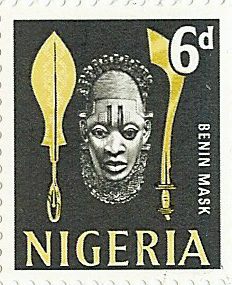
- Stamp of the festival Festac,, (c) Dominique Malaquais and Cédrid Vincent.
Taking the photographs from Independence Day 1934-1975 as a starting point, this workshop proposes to observe the itineraries of images and the stories associated to them, in collaboration with Maryam Jafri, Virginie Bobin, Dominique Malaquais (Researcher at Center for African Worlds Studies, CNRS) and Cédric Vincent (Doctor in Anthropology and researcher at the Center for Anthropology of writing, EHESS), and Sarah Frioux-Salgas (Head of Archive at Collections documentation, Quai Branly Museum). Their work will be presented in the exhibition, on a blog and during guided tours.
Visit the diary of the workshop.
//
WRITING AN EVENT
Writing workshop organized in collaboration with Julie Ramage, in the frame of UFR LAC at Paris Diderot University.
From January 9 to May 9
Transforming a fact into an event require the intervention of writing, whether visual or textual; an event is defined in the modalities of this narration. Writing the ordinary or the extraordinary result from the same process of mediatic transformation. The workshop will look at contemporary artists using video, performance, installation and literature to write the banal, the daily affairs or national events. An edition will be available at Bétonsalon – Center for Art and Recherche and on Paris Diderot’s campus after the workshop.
//
OUT OF FRAME: EGUALITY / HYBRIDITY / AMBIVALENCE
A workshop organized in partenership with Ecole Superieure d’Art and Design of Toulon Provence.
April 20-24. Public event on Saturday April 25
With Anaïs Dormoy, Jean-Loup Faurat, Géraldine Martin, Edouard Monnet, Julie Origné, Axelle Rossini, Ian Simms et Mabel Tapia.
Reluctant to oppose a certain number of founding ideas underlying modernism and the theoretical tools developed in the field of cultural studies that they find just as pertinent, the research project at the Toulon School of Art (ESADTPM) endeavours to trace the genealogy, migrations and theoretical links and shifts between what one could term on the one hand, the principle of equality and, on the other hand, notions such as hybridity, ambivalence and decentering. The research group will gather for a week during the exhibition The Day After to question the spaces beyond the visual in Maryam Jafri’s work in connection with the research group’s own preoccupations.
Share